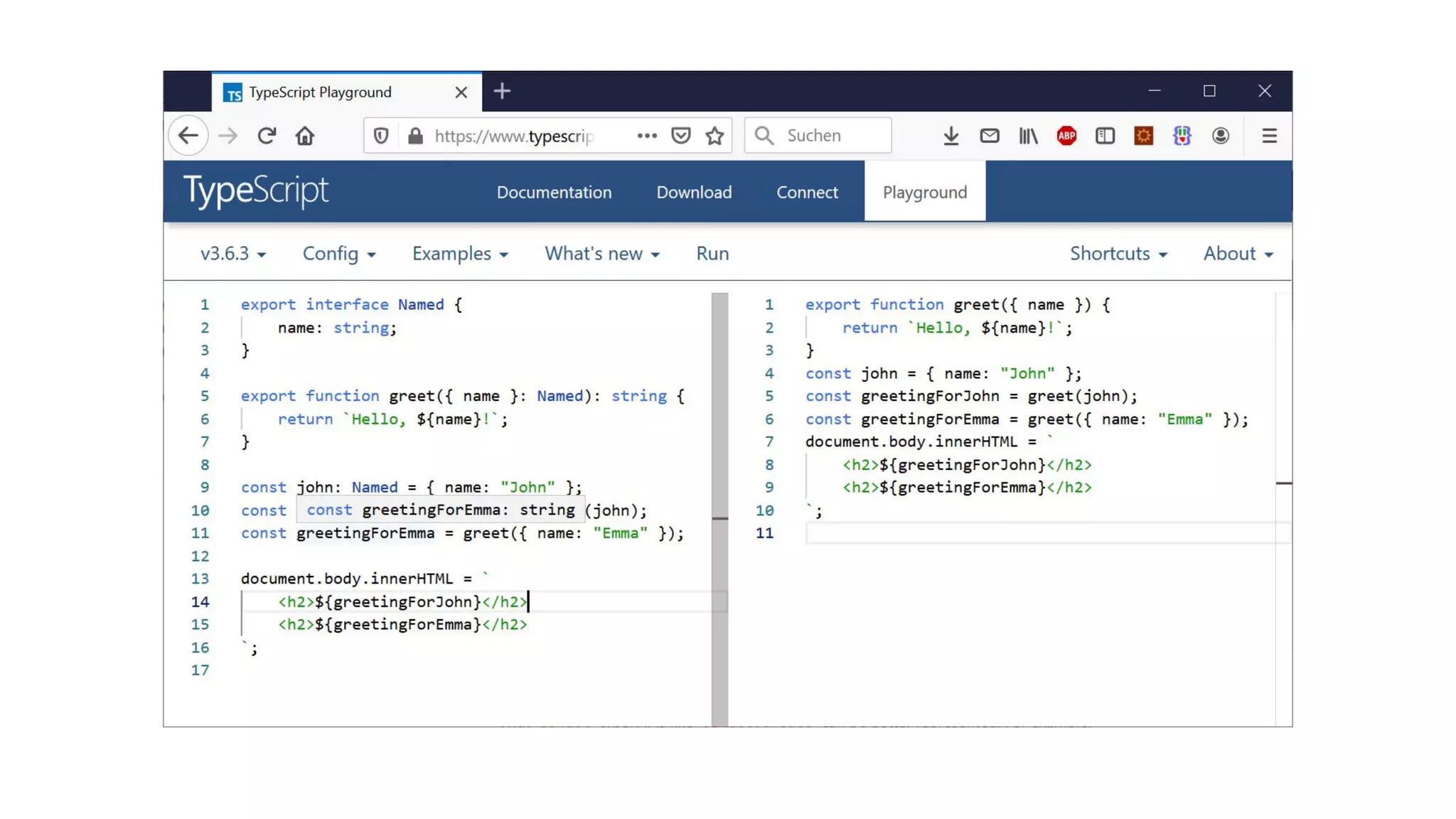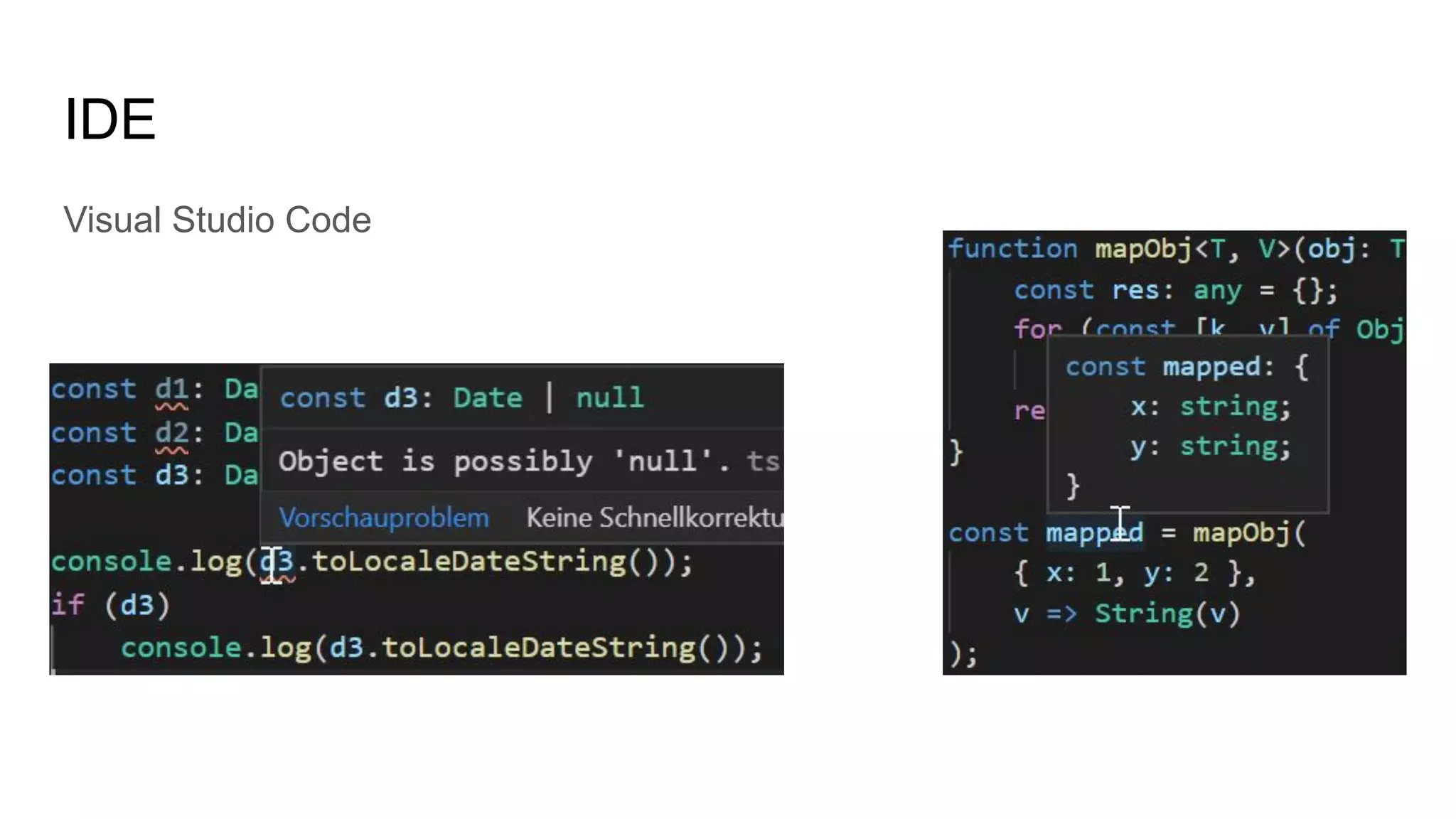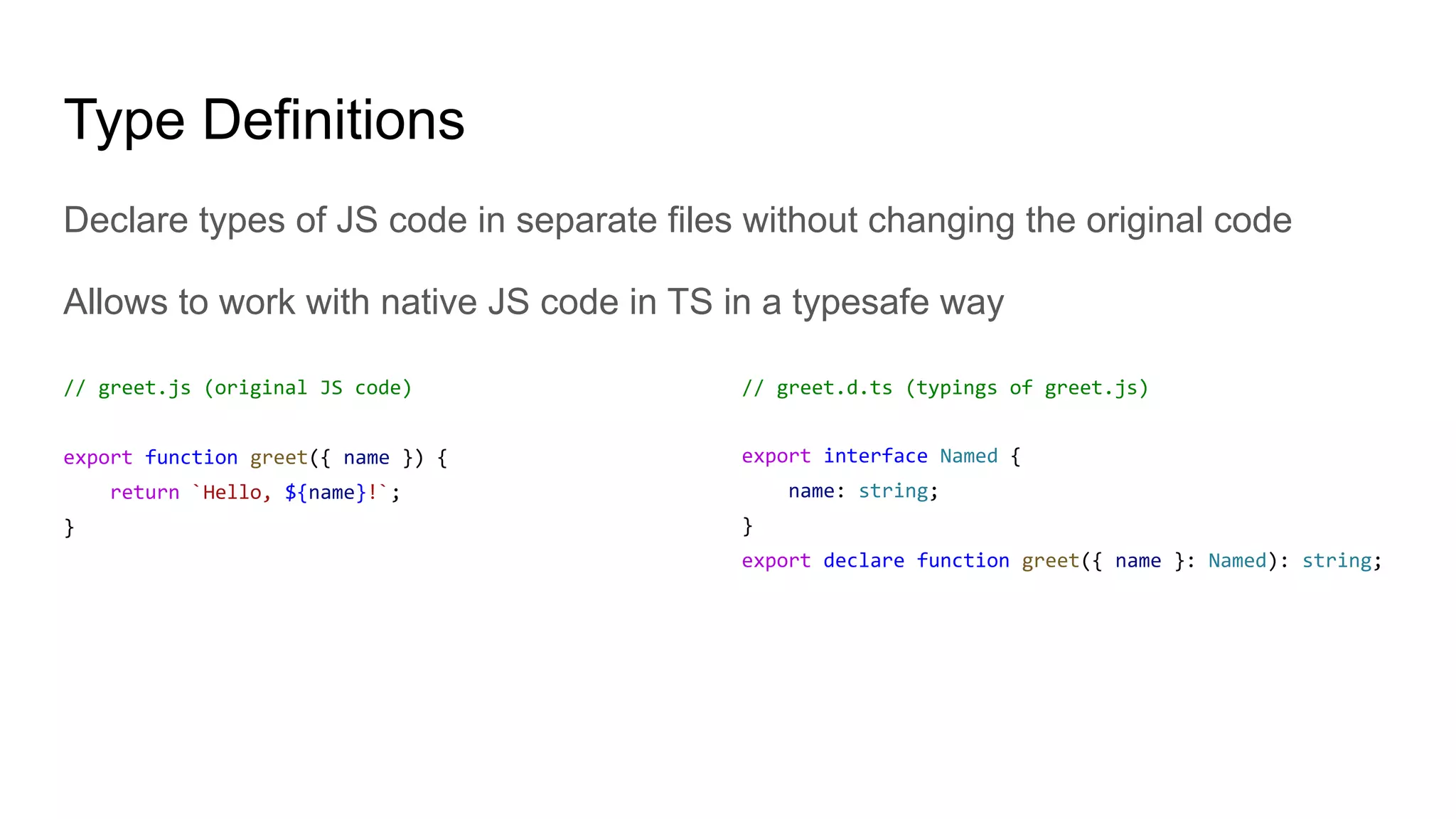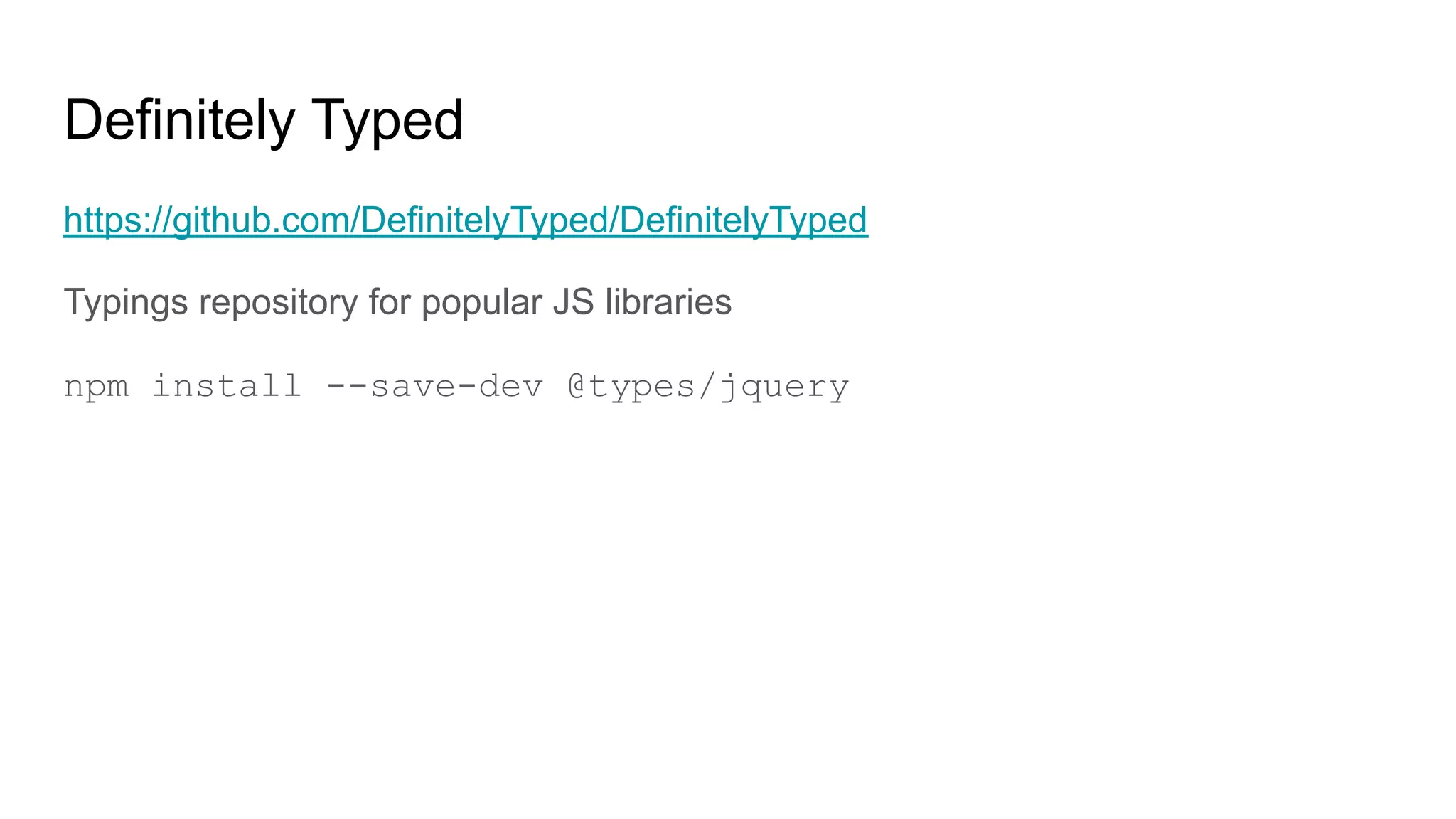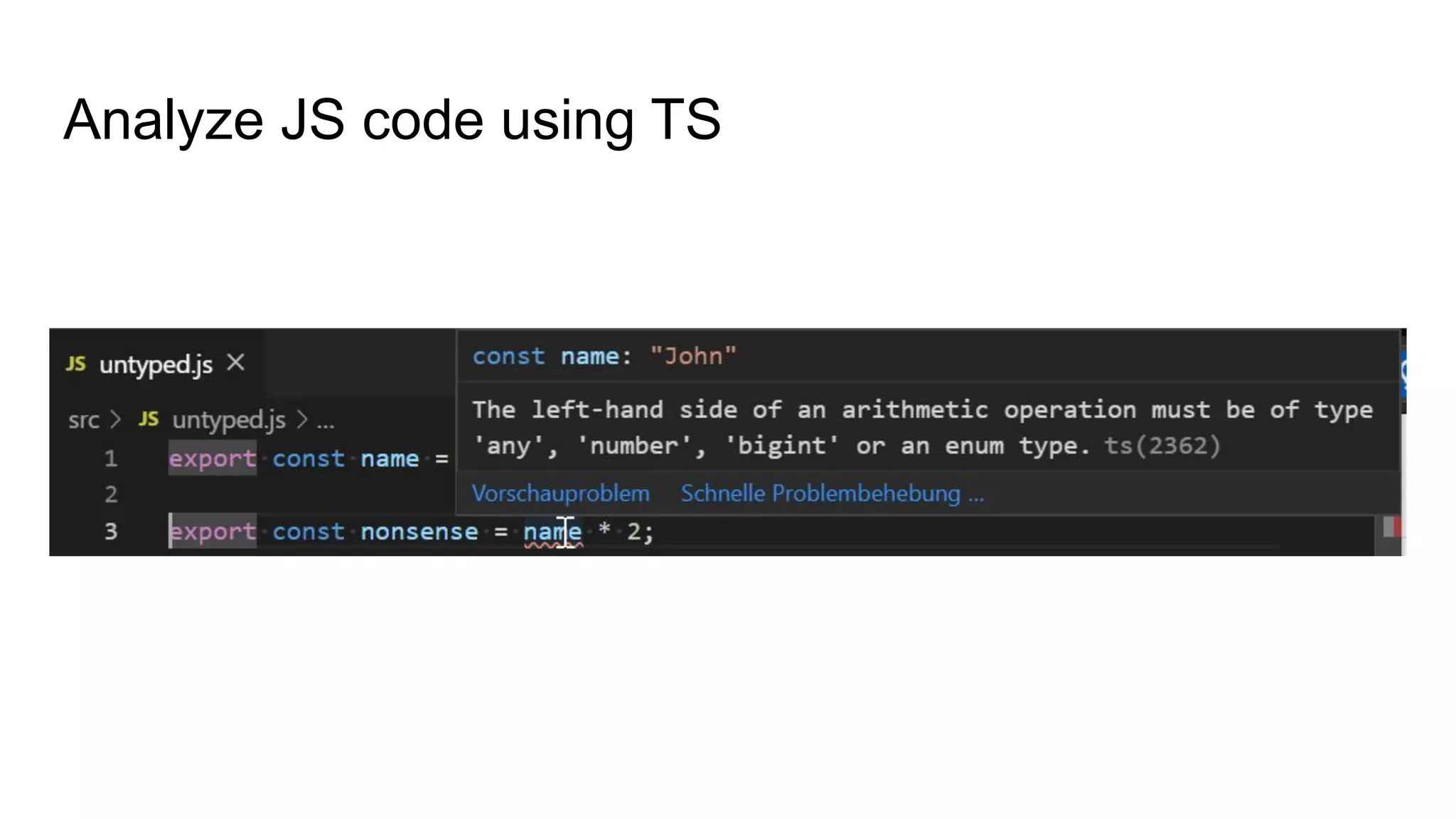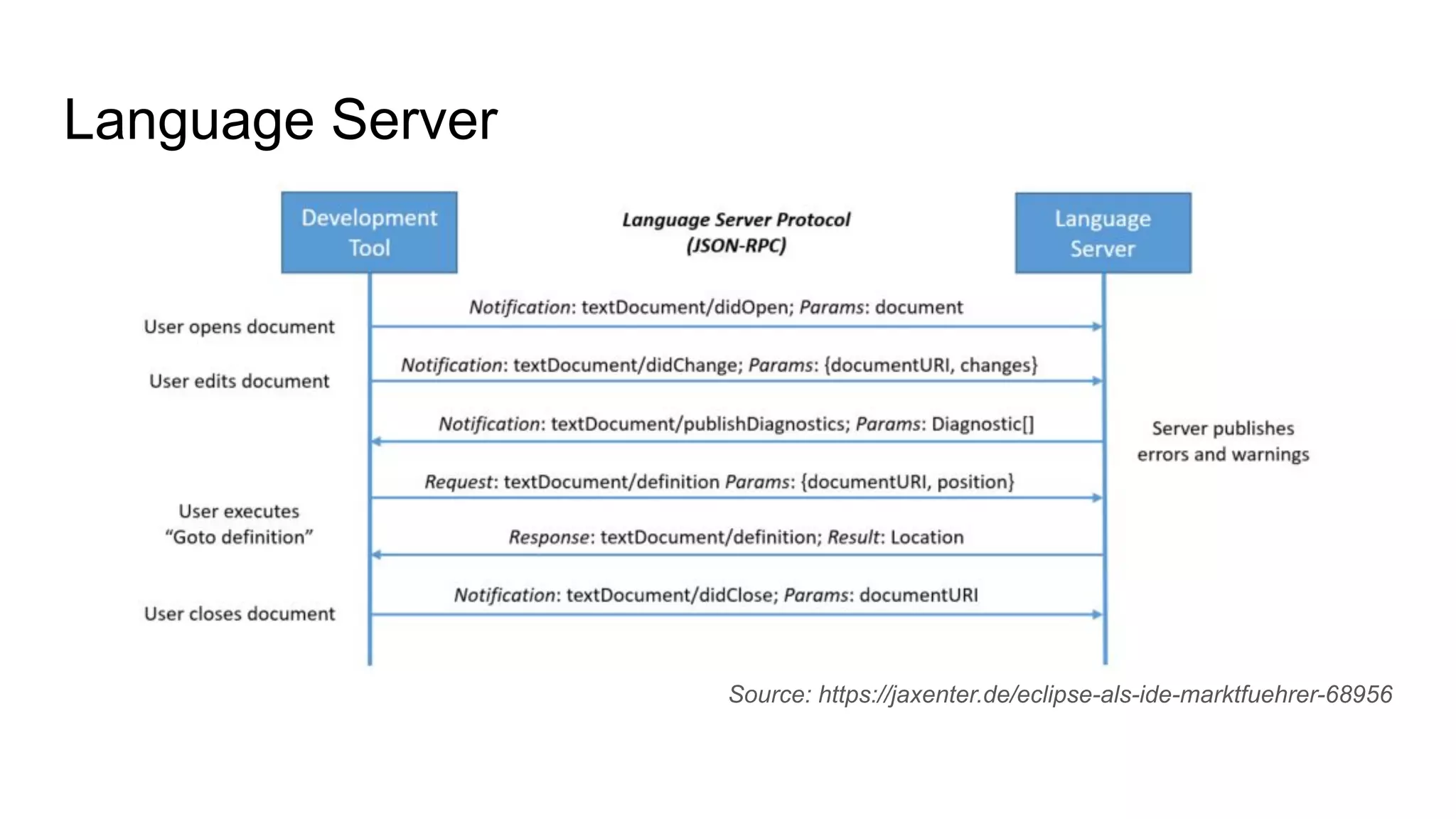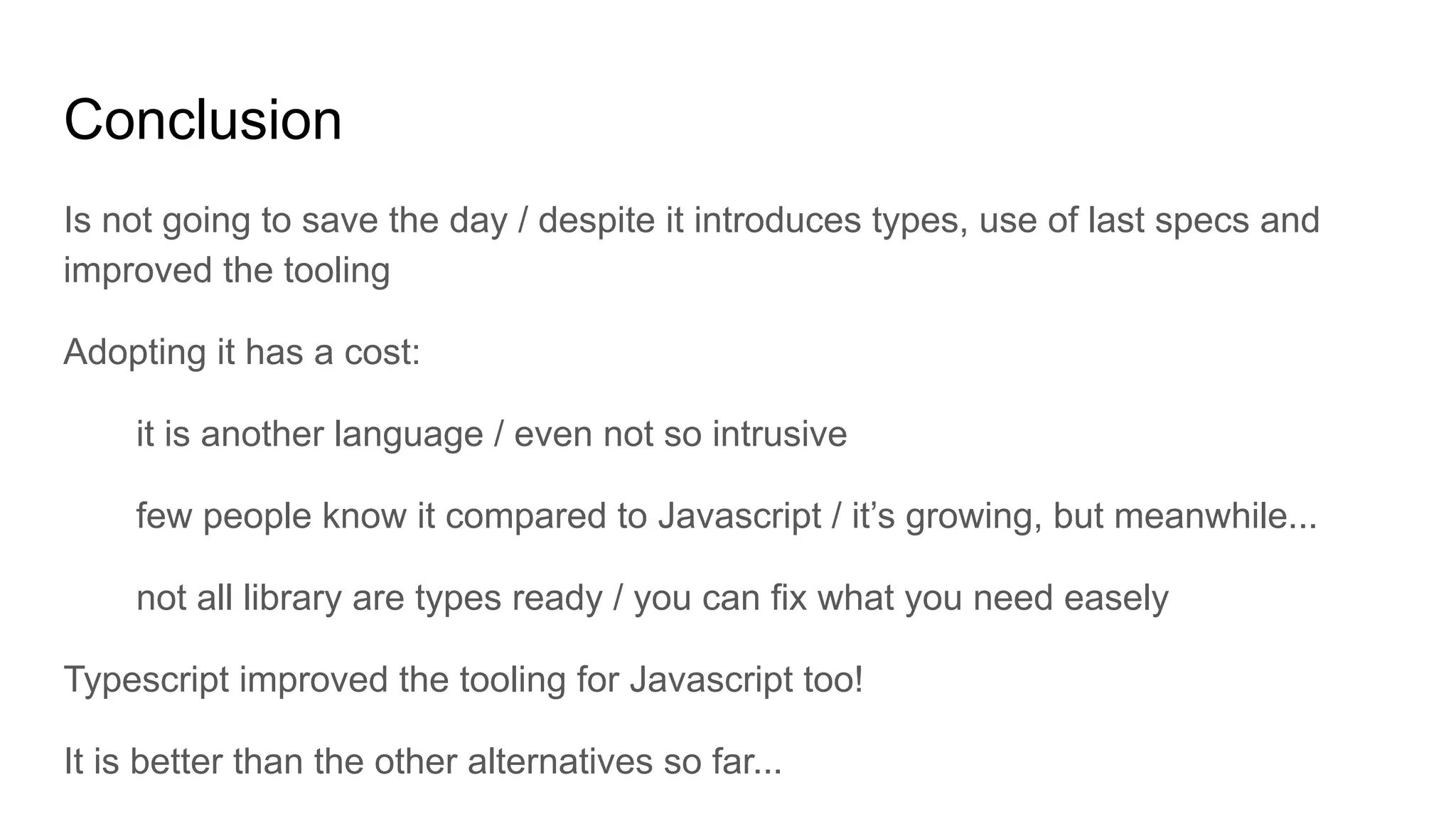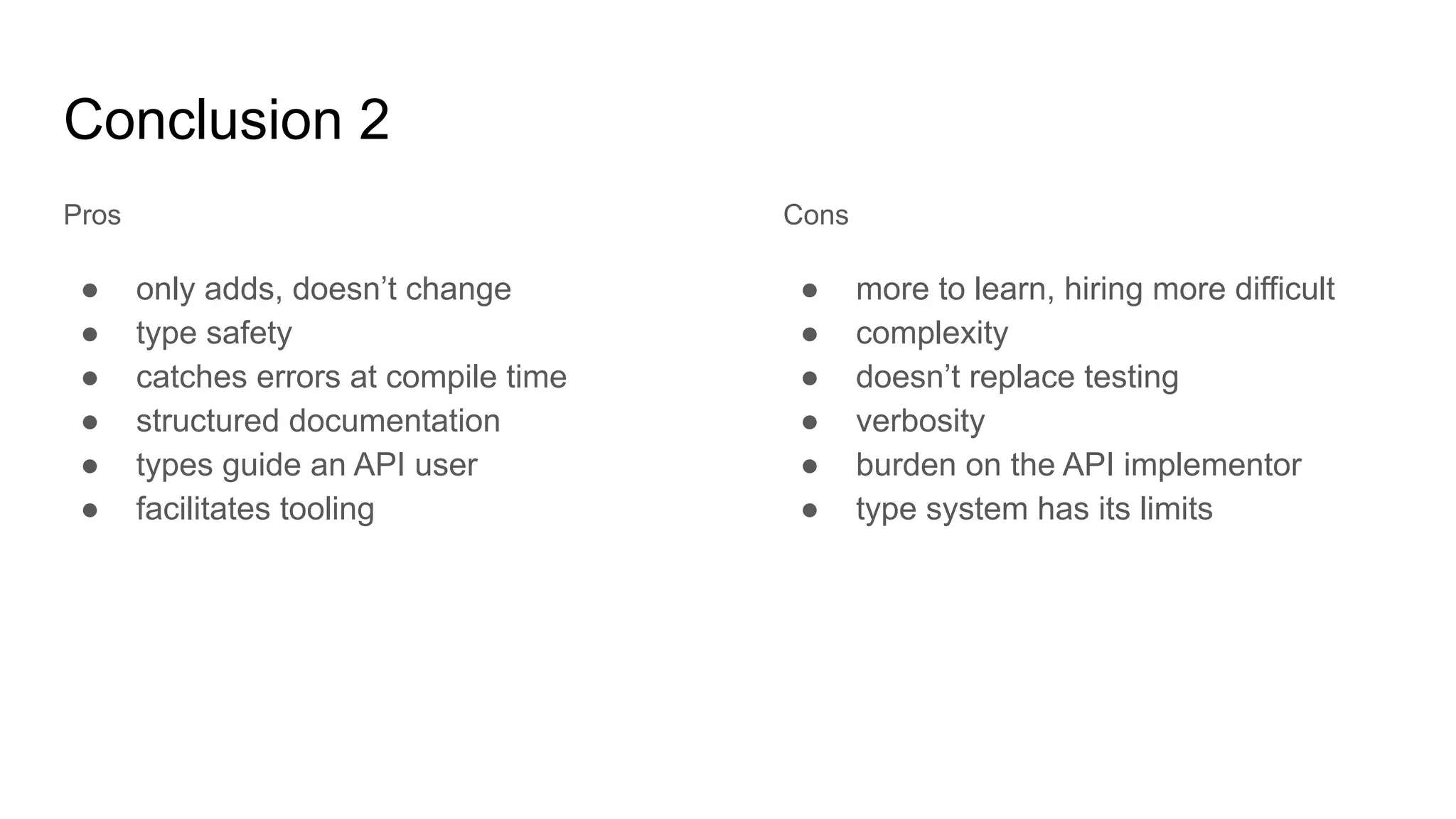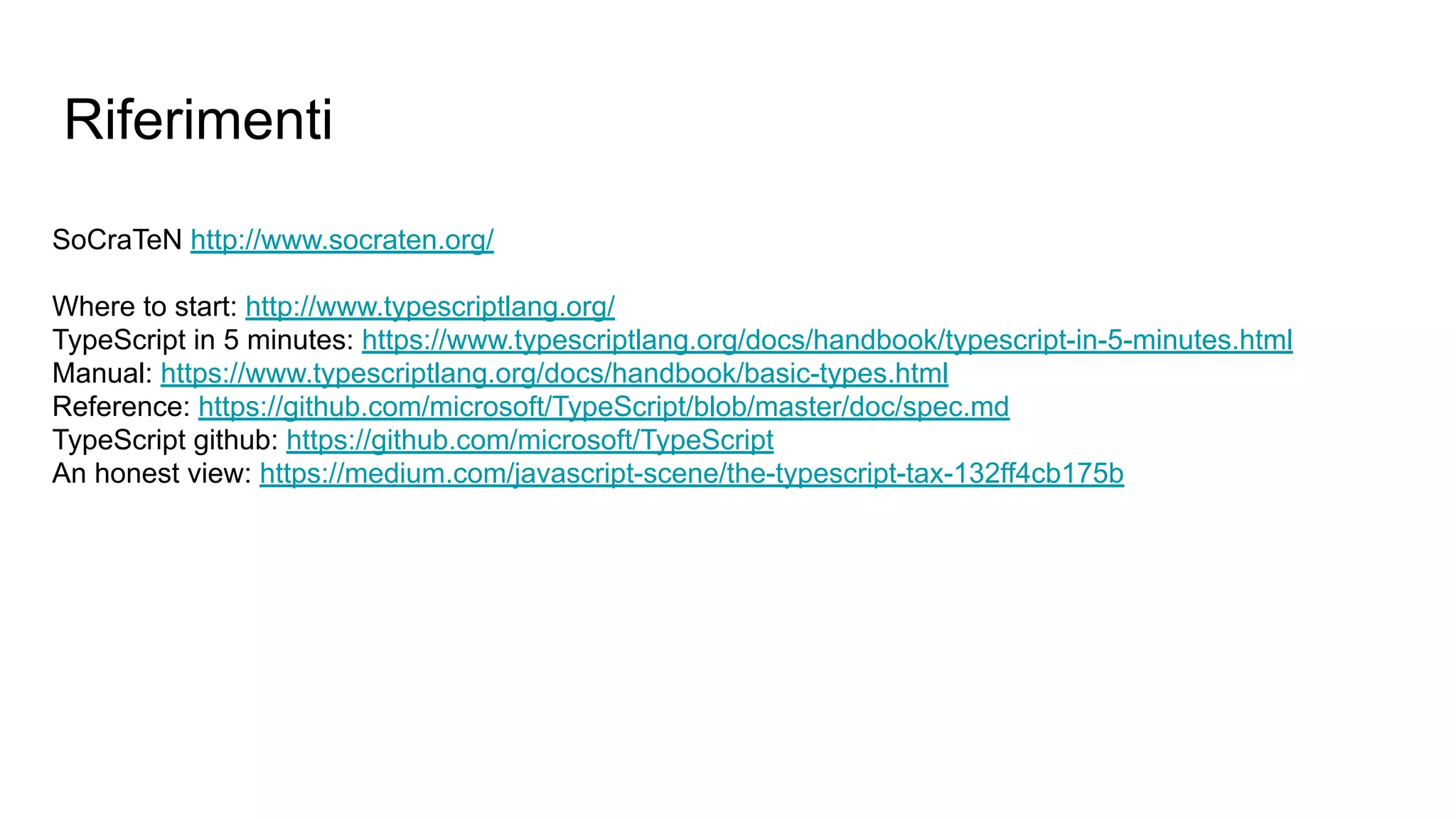TypeScript (TS) adds types and tooling to JavaScript (JS) to improve code quality and catch errors earlier. It is a superset of JS that compiles to plain JS. Key features include type annotations, classes, interfaces, generics and tooling like Visual Studio Code with IntelliSense. While TS adds complexity, it improves code organization, documentation and catches errors at compile time rather than runtime. The type system has limits but TS is a useful alternative to other languages for large JS projects.
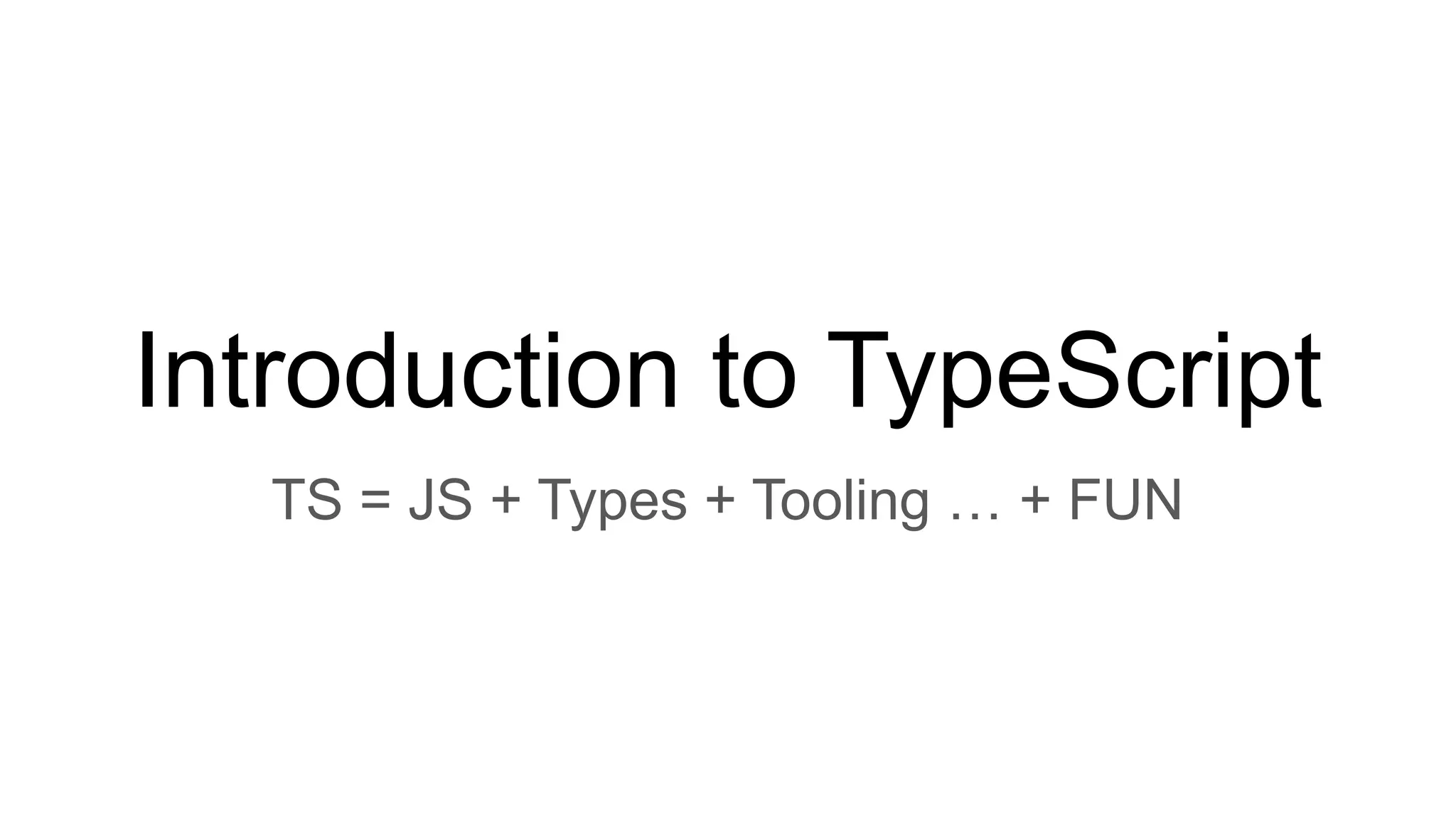

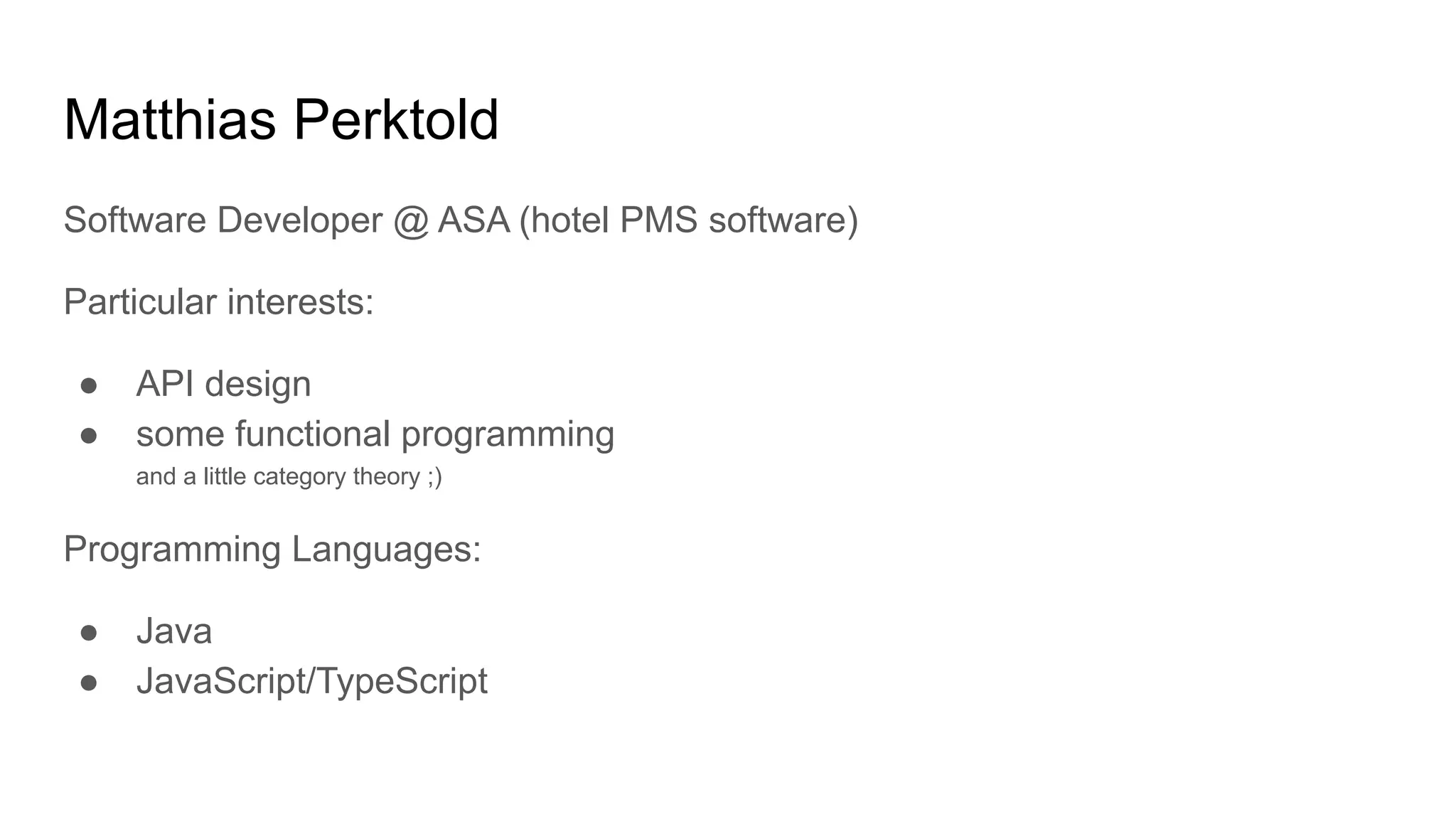

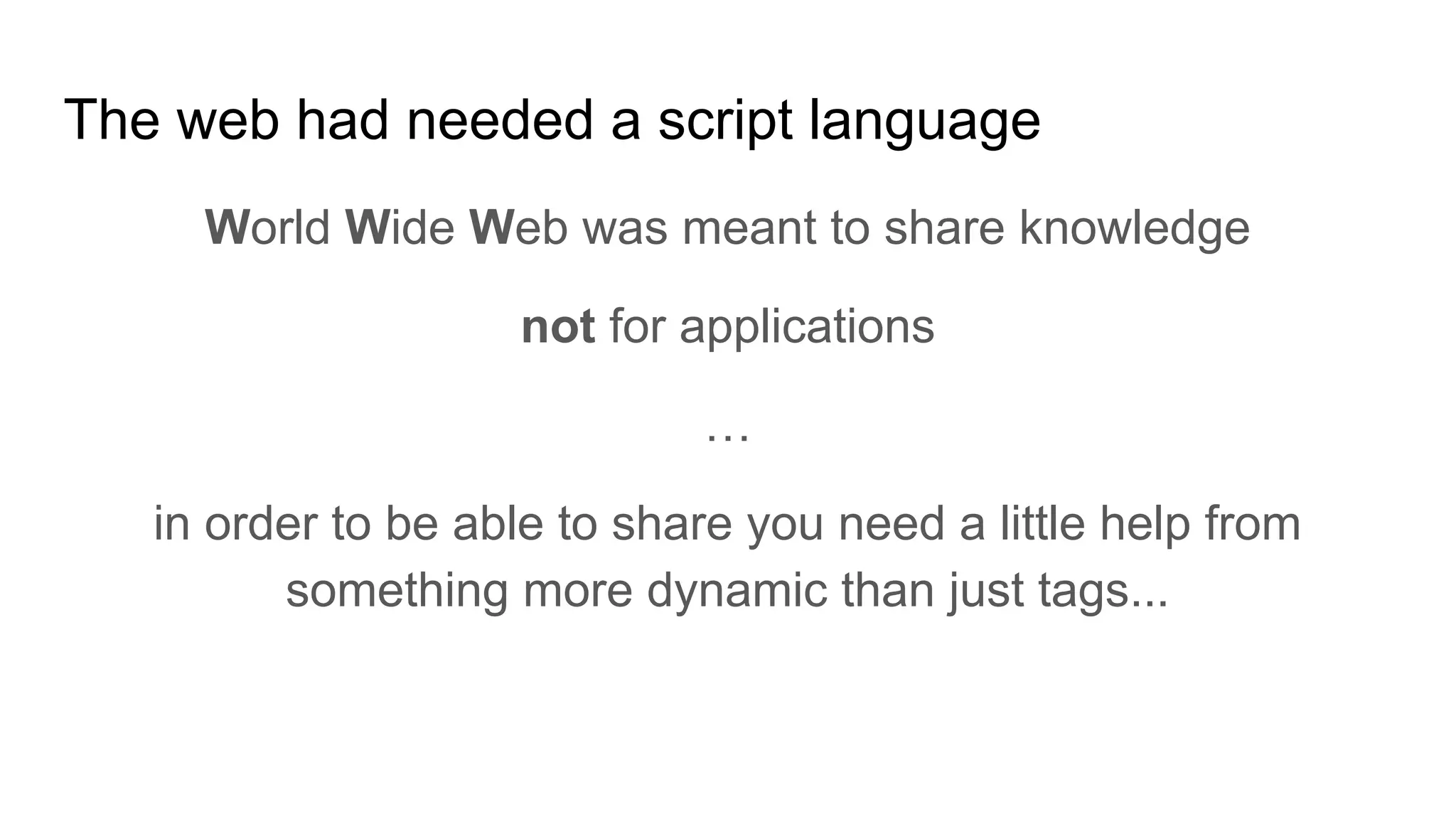
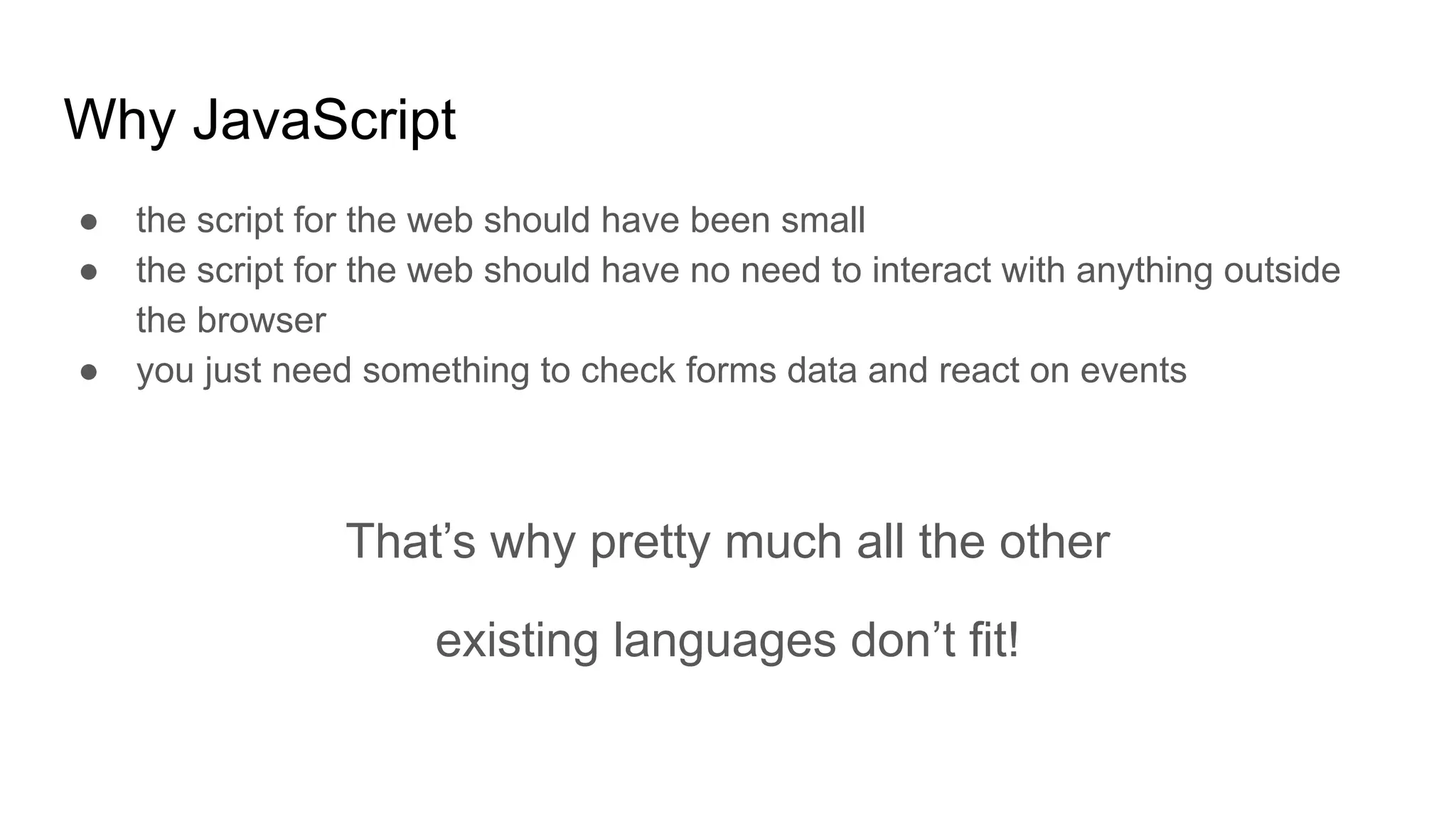
![It was just...
<script>
alert(“Hello”);
</script>
...
<button
onClick=”document.forms.0.input[‘name’].value != ‘’”>
Submit
</button>
...
<script>
document.write(‘<p>Hello, World<blink>!</blink><br>’);
</script>](https://image.slidesharecdn.com/introduzioneatypescript-191107210947/75/Introduction-to-typescript-7-2048.jpg)
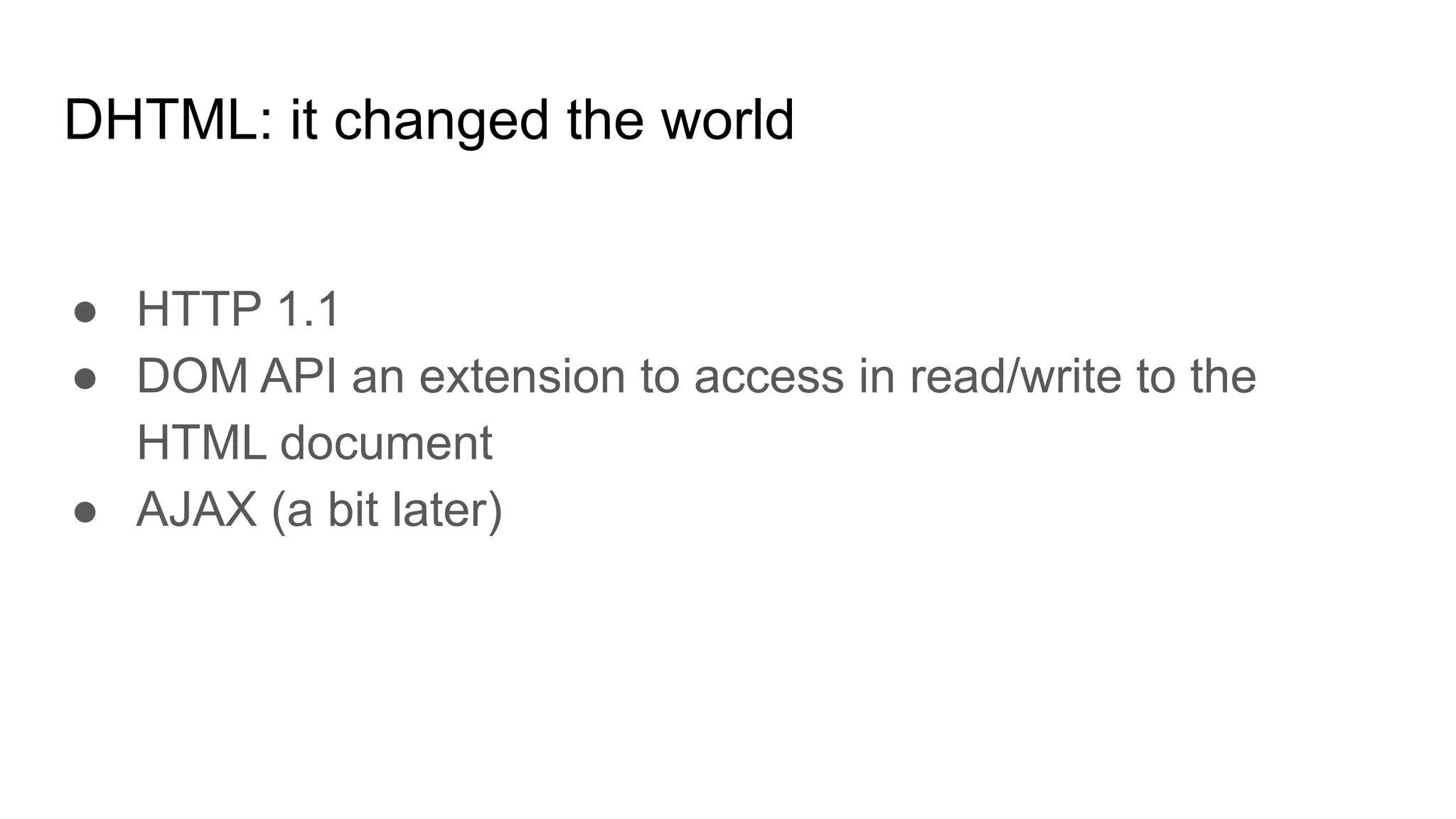
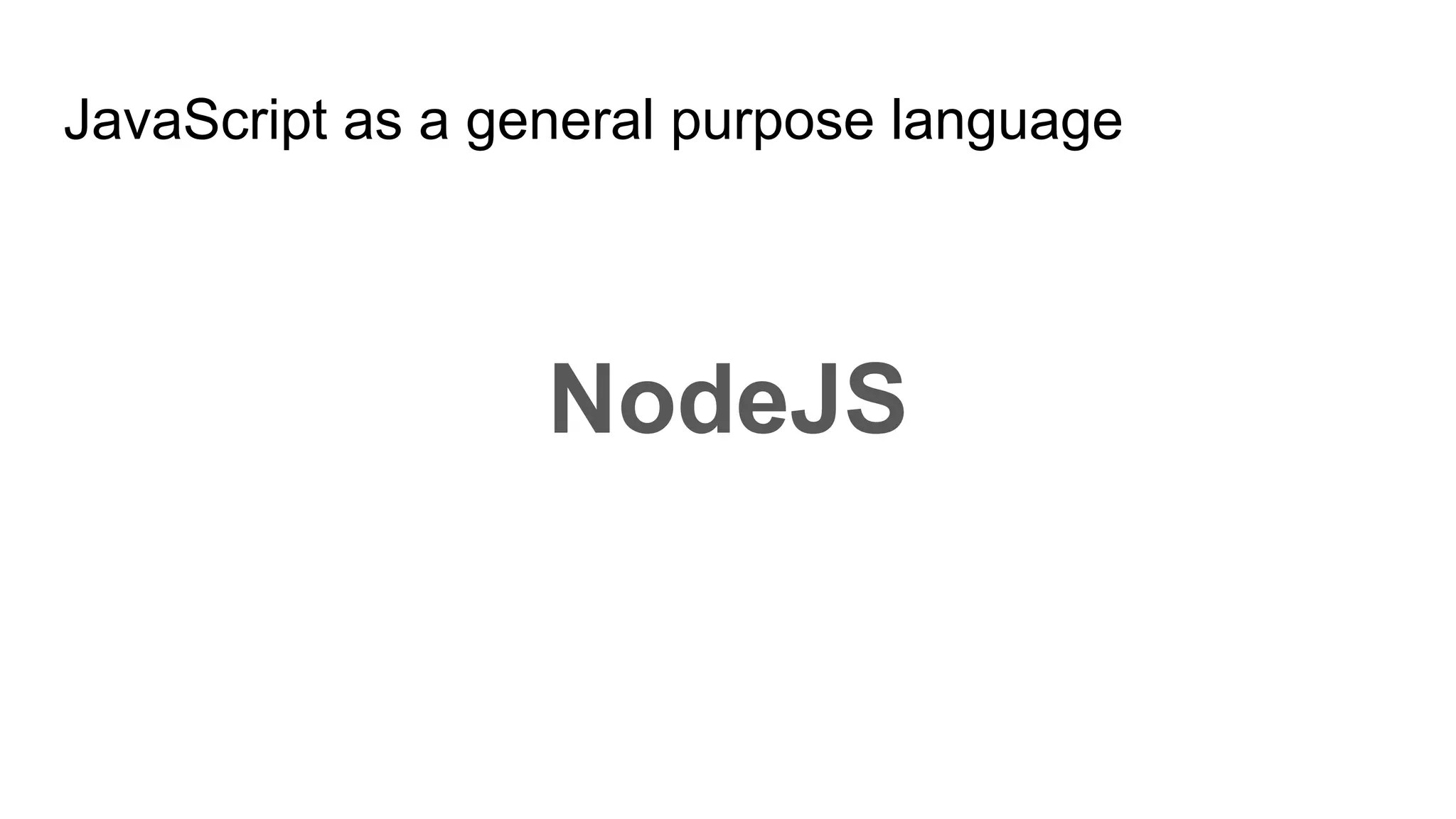
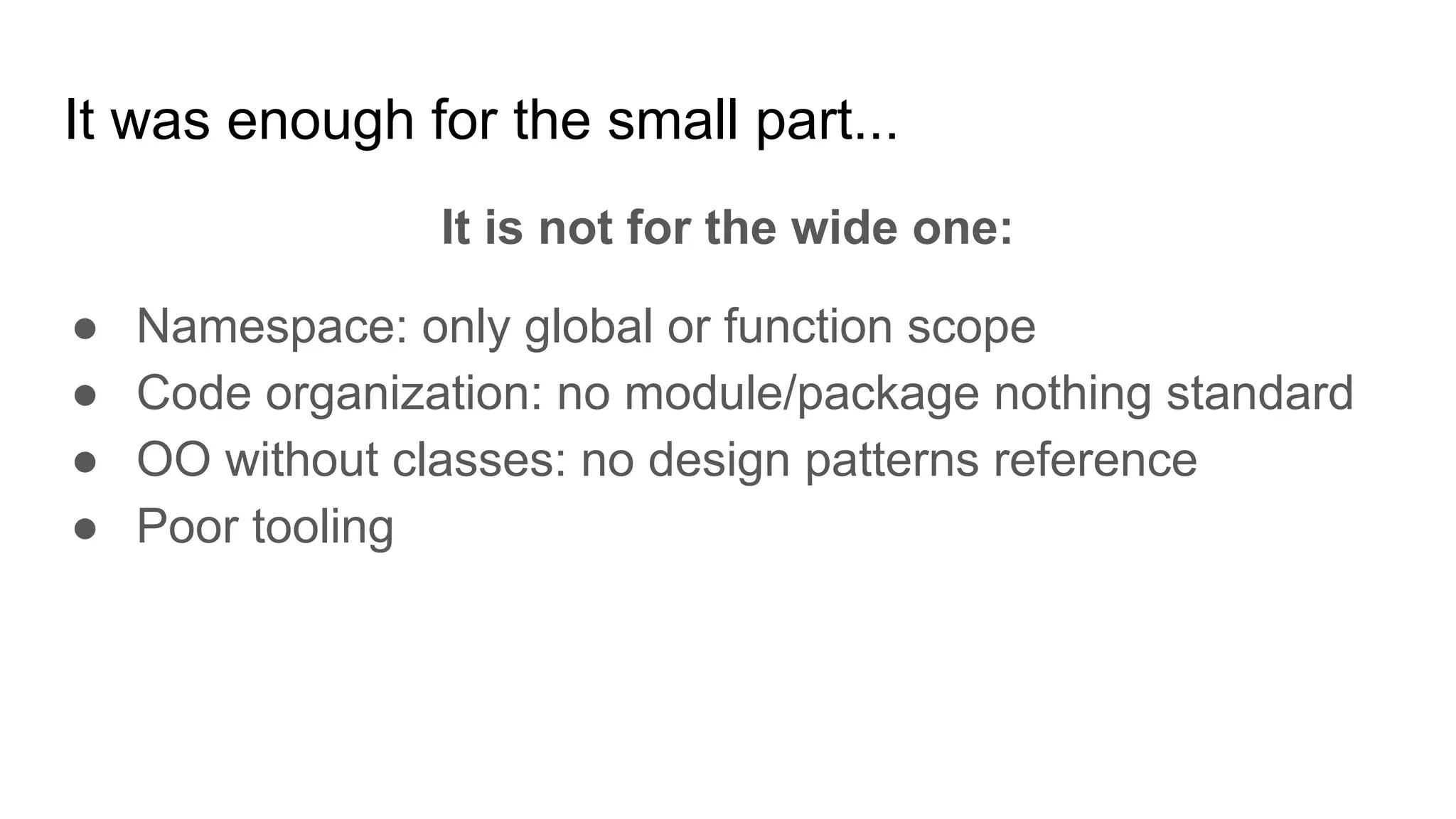



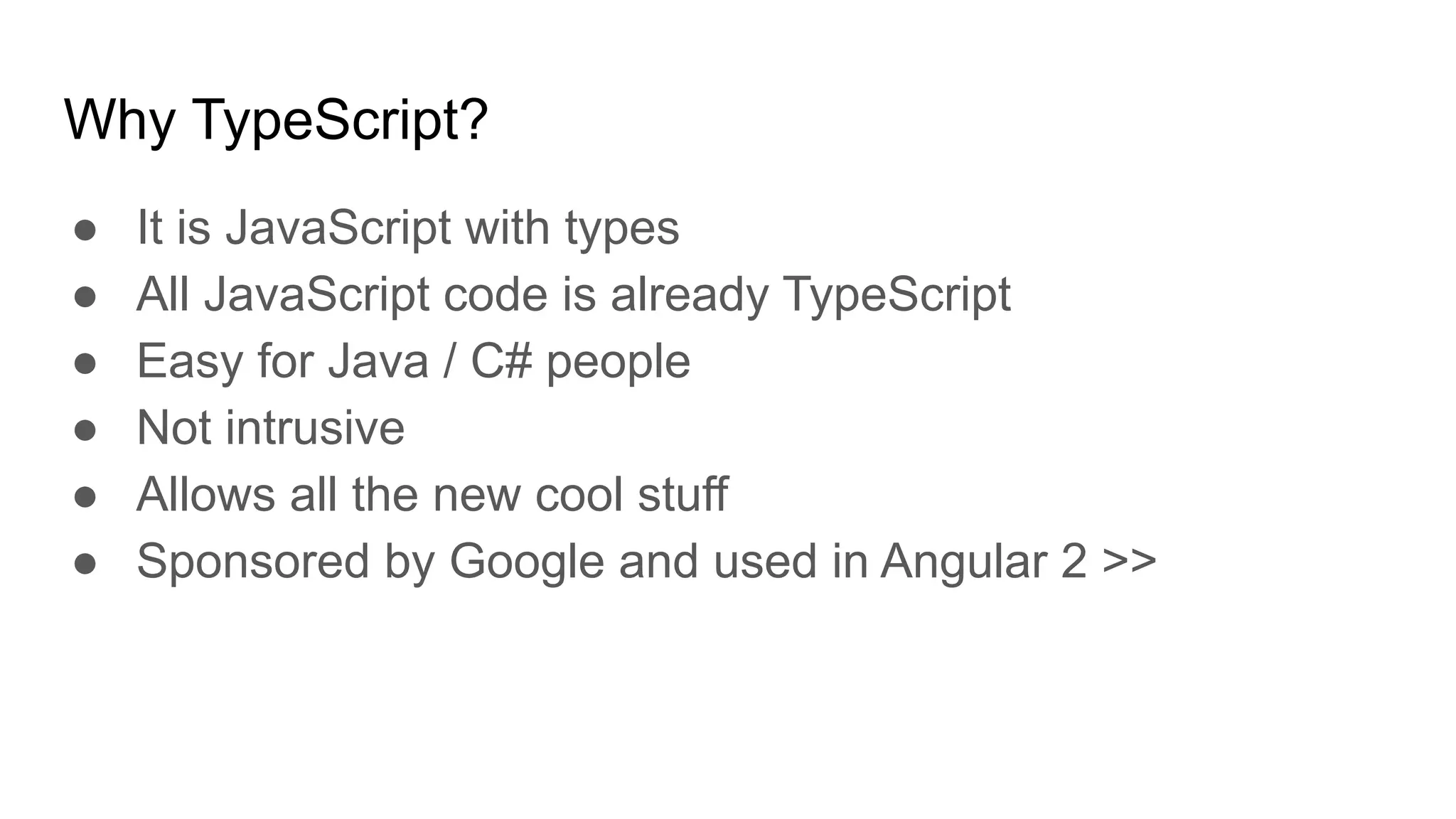
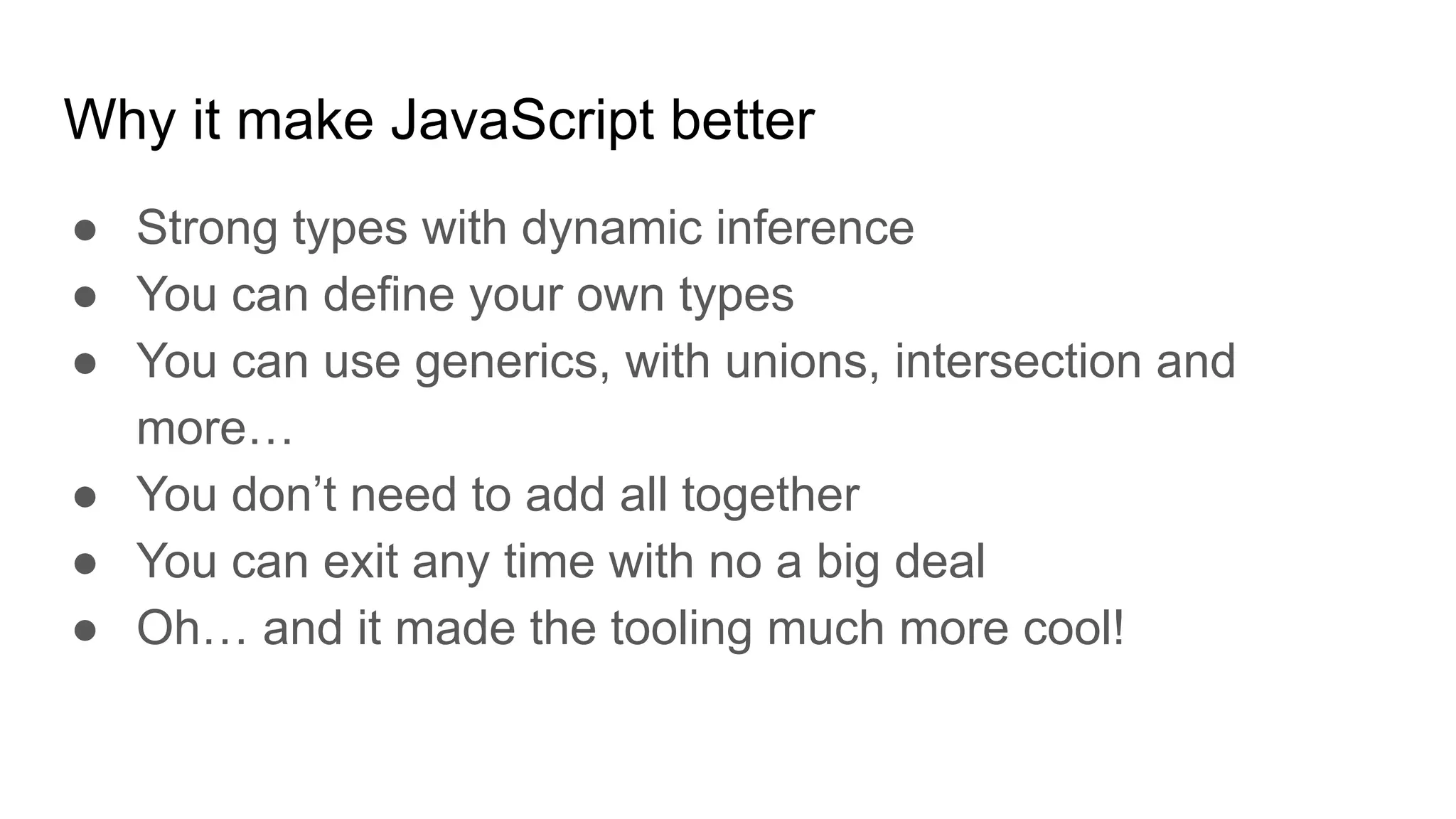

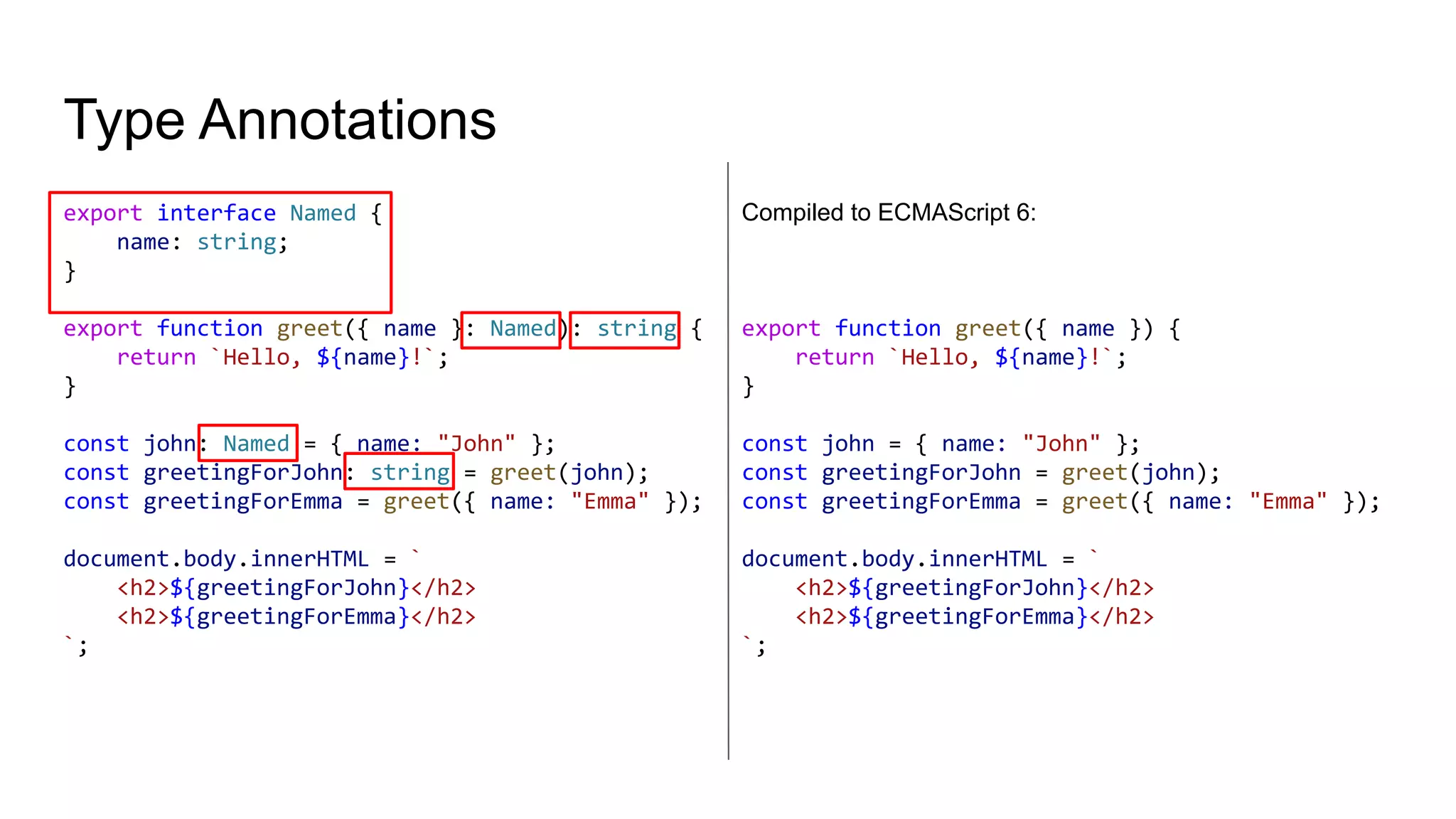
![Classes and More Types
import { greet } from "./type-annotations";
class Person {
public readonly name: string;
constructor(
public readonly firstName: string,
public readonly lastName: string,
public readonly interests: string[] = []
) {
this.name = `${firstName} ${lastName}`;
}
public isInterestedIn(topic: string): boolean {
const idx: number = this.interests.indexOf(topic);
return idx >= 0;
}
}
const john: Person = new Person(
"John", "Doe",
["Politics", "Sports", "Programming"]
);
john.firstName = "Fred";
// -> Error: Cannot assign to 'firstName'
because it is a read-only property.
type ShowFn = (arg: any) => void;
const log: ShowFn = arg => console.log(arg);
log(john);
// Structural Typing
// -> Person is assignable to Named
log(greet(john));](https://image.slidesharecdn.com/introduzioneatypescript-191107210947/75/Introduction-to-typescript-18-2048.jpg)

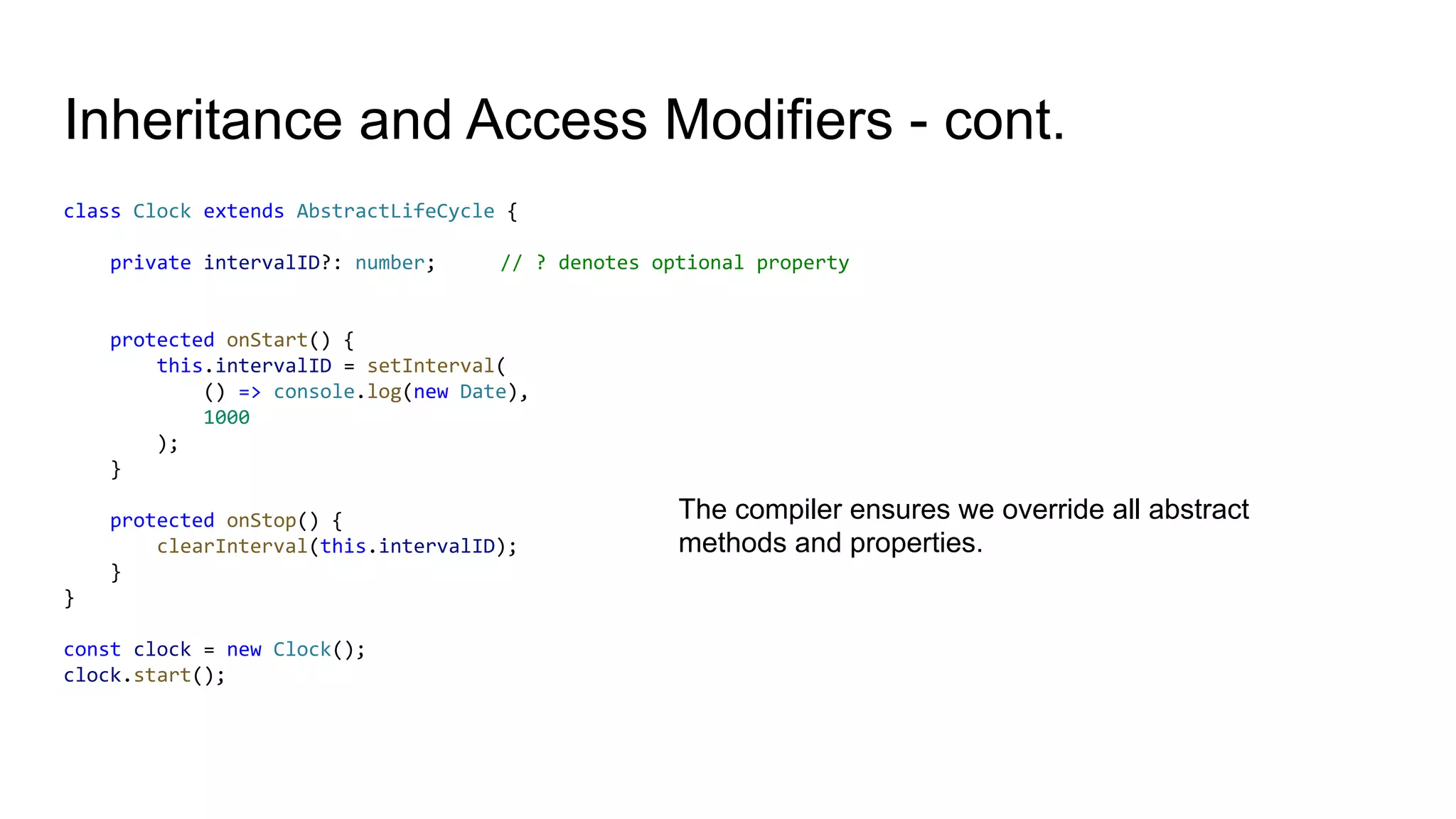
![Function Overloads
function plus(n1: number, n2: number): number;
function plus(s1: string, s2: string): string;
function plus<T>(a1: T[], a2: T[]): T[];
function plus(a1: any, a2: any): any {
return typeof a1 === "number"
? a1 + a2
: a1.concat(a2);
}
const n = plus(1, 2); // 3
const s = plus("1", "2"); // "12"
const a = plus([1], [2]); // [1, 2]
const x = plus(1, "2"); // Compiler Error](https://image.slidesharecdn.com/introduzioneatypescript-191107210947/75/Introduction-to-typescript-21-2048.jpg)
![Tuples
function minMax(nums: number[]): [number, number] {
return [Math.min(...nums), Math.max(...nums)];
}
const [minNums, maxNums] = minMax([1,2,3,4]); // [1, 4]
function partition<T>(arr: T[], pred: (v: T) => boolean): [T[], T[]] {
const pass: T[] = [];
const fail: T[] = [];
for (const v of arr)
(pred(v) ? pass : fail).push(v);
return [pass, fail];
}
const [evens, odds] = partition([1,2,3,4], x => x % 2 === 0);
console.log(evens); // 2, 4
console.log(odds); // 1, 3](https://image.slidesharecdn.com/introduzioneatypescript-191107210947/75/Introduction-to-typescript-22-2048.jpg)
![Tuples are already part of JS
interface Point {
x: number;
y: number;
}
const point: Point = { x: 3, y: 5 };
const entries: [string, number][] = Object.entries(point); // [ ["x",3], ["y",5] ]
for (const [key, value] of entries)
console.log(`${key} = ${value}`);
// logs:
// x = 3
// y = 5](https://image.slidesharecdn.com/introduzioneatypescript-191107210947/75/Introduction-to-typescript-23-2048.jpg)

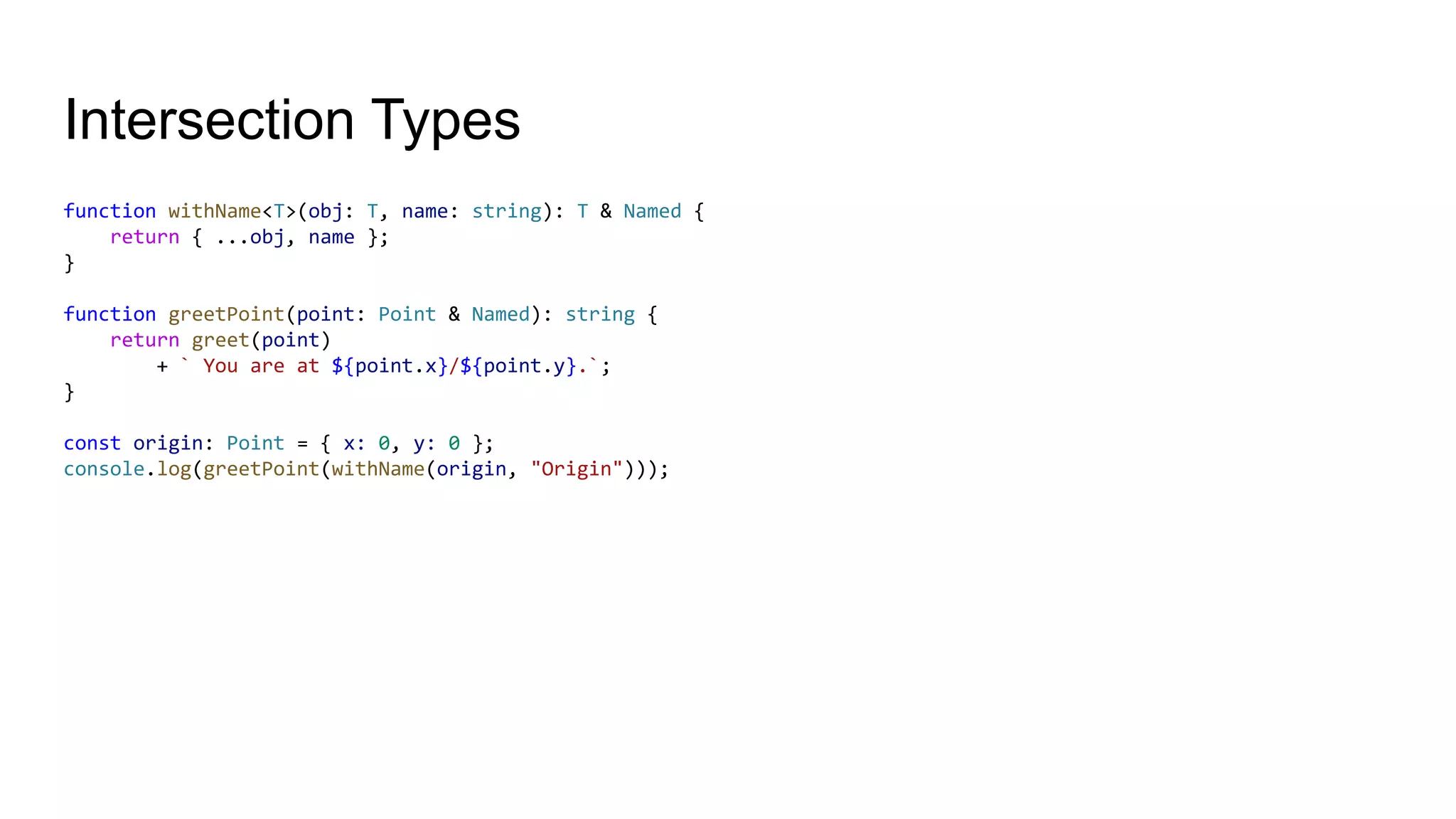
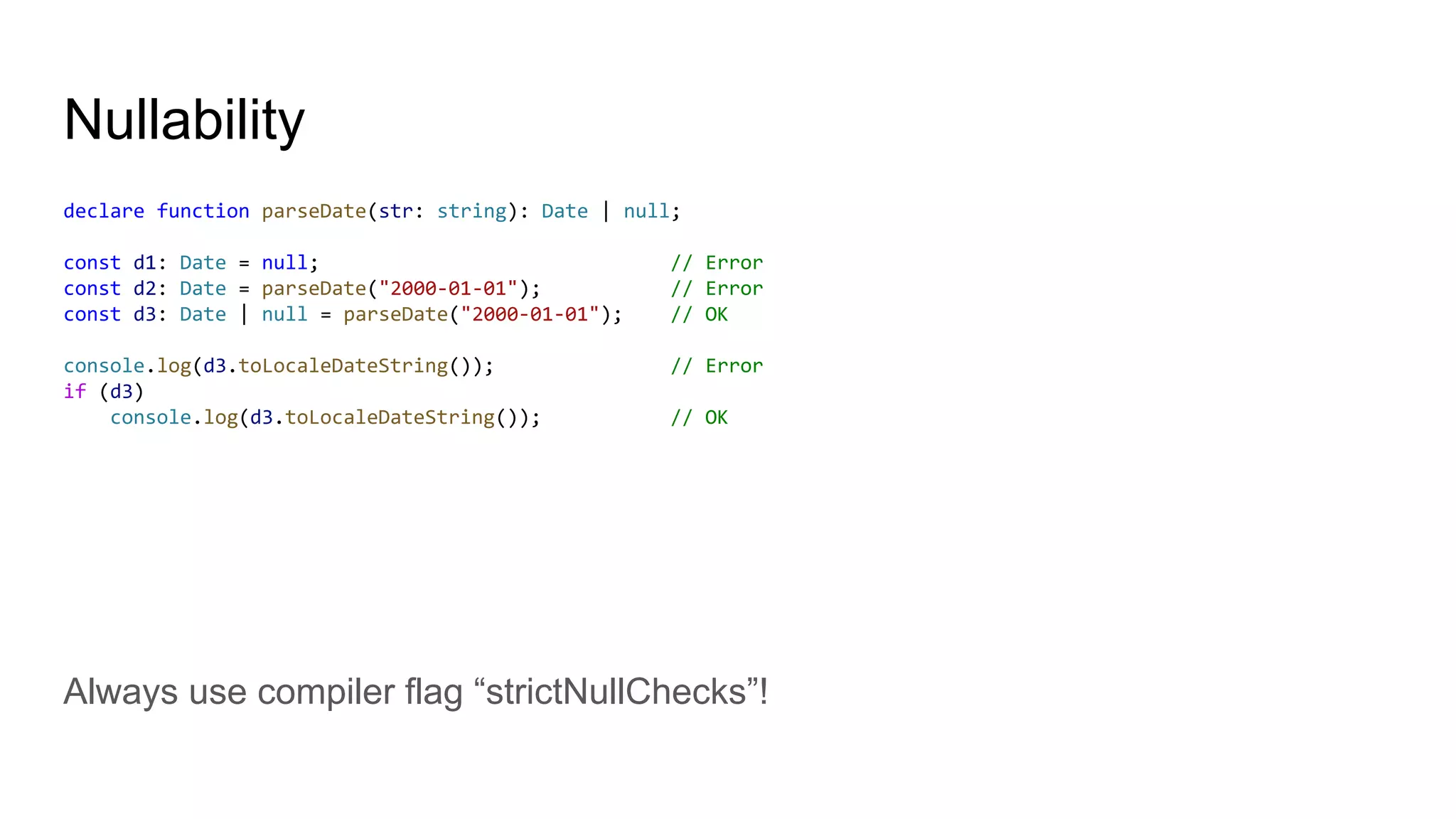
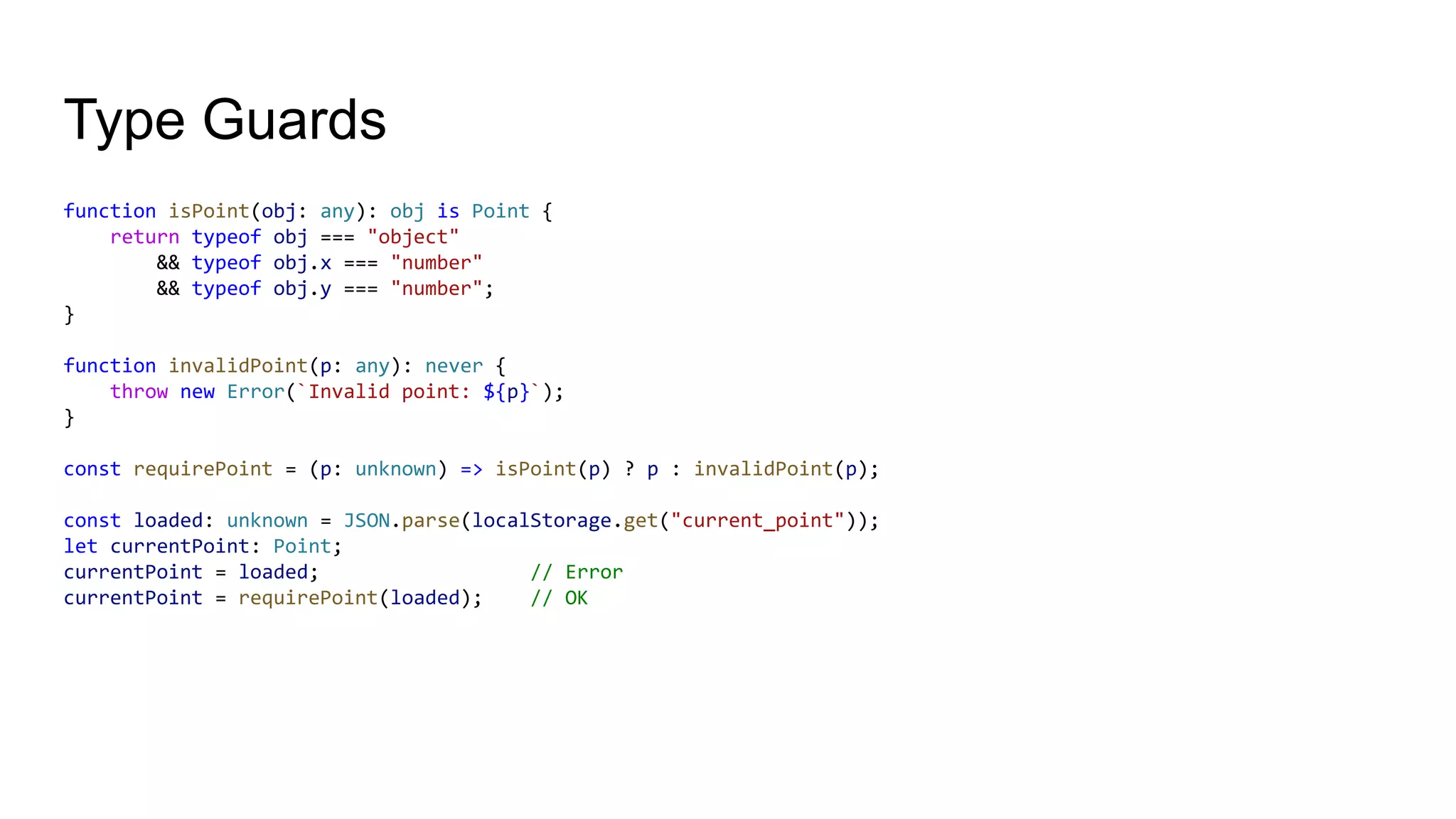
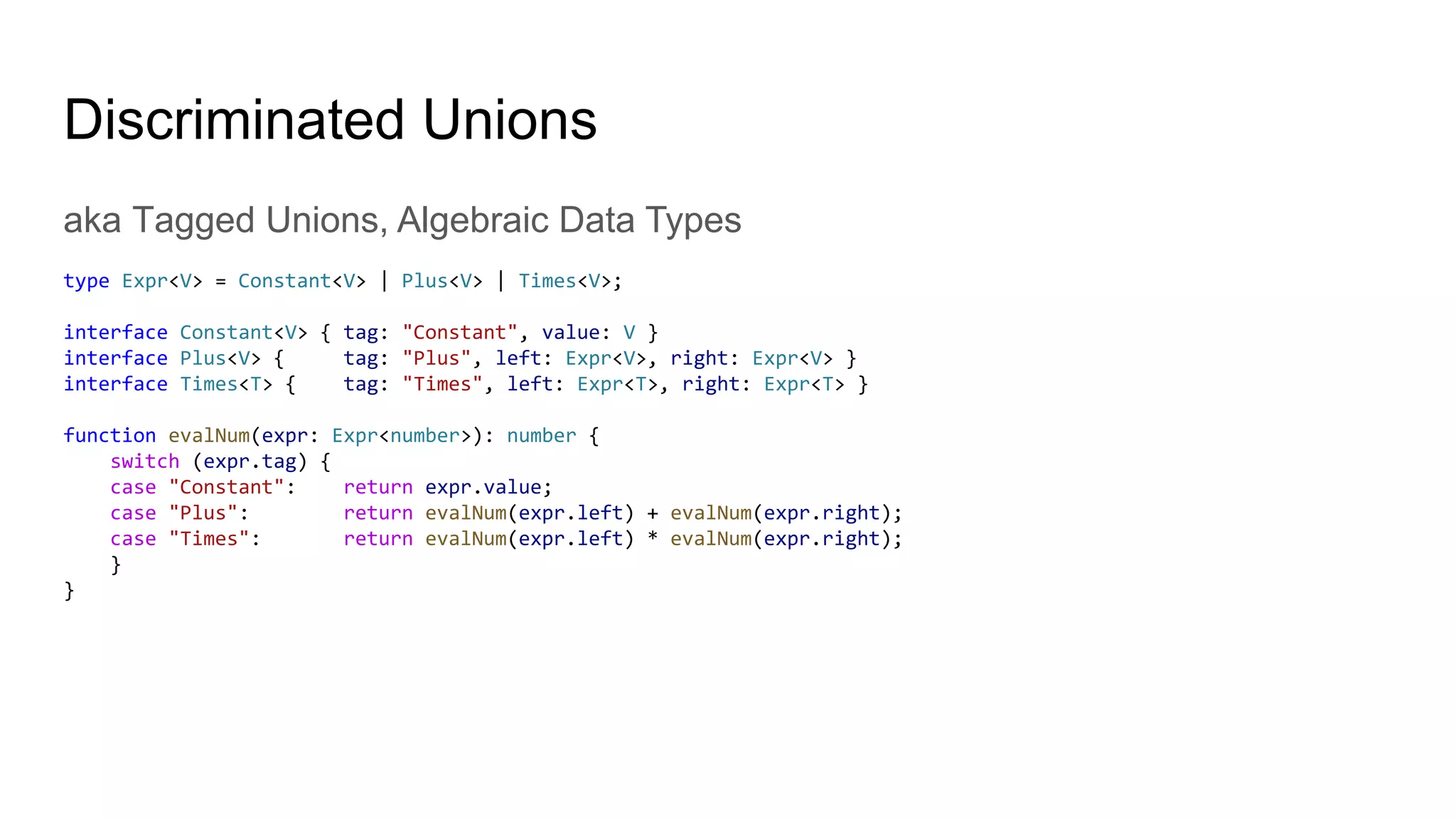
![Index Types and Mapped Types
type PointKeys = keyof Point; // "x" | "y"
type XOfPoint = Point["x"]; // number
function mapVals<T, V>(
obj: T,
fn: (v: T[keyof T]) => V
): {
[k in keyof T]: V
} {
const res: any = {};
for (const [k, v] of Object.entries(obj))
res[k] = fn(v);
return res;
}
const mapped = mapVals(
{ x: 1, y: 2 },
v => String(v)
); // { x: string, y: string }
console.log(mapped); // { x: "1", y: "2" }](https://image.slidesharecdn.com/introduzioneatypescript-191107210947/75/Introduction-to-typescript-29-2048.jpg)
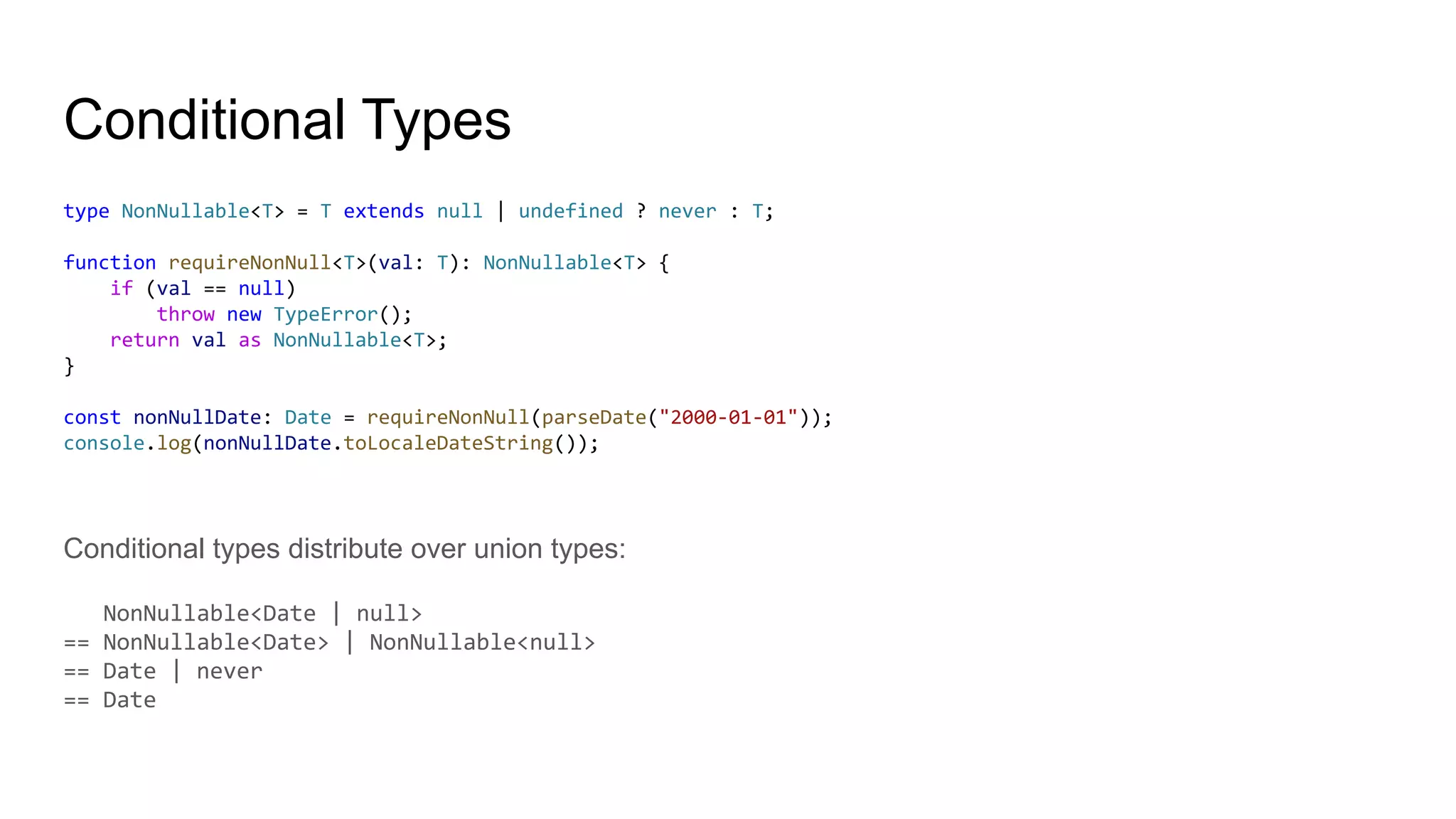
![Putting it Together
type Pick<T, K extends keyof T> = {
[P in K]: T[P];
};
type Exclude<T, U> = T extends U ? never : T;
type Omit<T, K extends keyof any> = Pick<T, Exclude<keyof T, K>>;
declare function pick<T, K extends keyof T>(obj: T, ...keys: K[]): Pick<T, K>;
declare function omit<T, K extends keyof T>(obj: T, ...keys: K[]): Omit<T, K>;
const pickedX = pick(point, "x"); // { x: number }
const omittedX = omit(point, "x"); // { y: number }](https://image.slidesharecdn.com/introduzioneatypescript-191107210947/75/Introduction-to-typescript-31-2048.jpg)
![Limits of the type system
type Func<I, O> = (arg: I) => O;
// Works, but only for a limited number of arguments
function pipe<A, B, C>(f1: Func<A, B>, f2: Func<B, C>): Func<A, C>;
function pipe<A, B, C, D>(f1: Func<A, B>, f2: Func<B, C>, f3: Func<C, D>): Func<A, D>;
function pipe<A, B, C, D, E>(f1: Func<A, B>, f2: Func<B, C>, f3: Func<C, D>, f4: Func<D, E>): Func<A, D>;
function pipe<A, B, C, D, E, F>(f1: Func<A, B>, f2: Func<B, C>, f3: Func<C, D>, f4: Func<D, E>, f5: Func<E, F>):
Func<A, F>;
function pipe(...fns: Func<any, any>[]): Func<any, any> {
return arg => fns.reduce((res, f) => f(res), arg);
}
const fThenG = pipe(f, g); // x => g(f(x))](https://image.slidesharecdn.com/introduzioneatypescript-191107210947/75/Introduction-to-typescript-32-2048.jpg)
![Limits of the type system 2
No higher-kinded types
// Collects the results of a list of actions.
// Like Promise.all(), but works for any Monad, not only Promise.
// Possible in Haskell, but not in TS
sequence :: Monad m => [m a] -> m [a]](https://image.slidesharecdn.com/introduzioneatypescript-191107210947/75/Introduction-to-typescript-33-2048.jpg)

